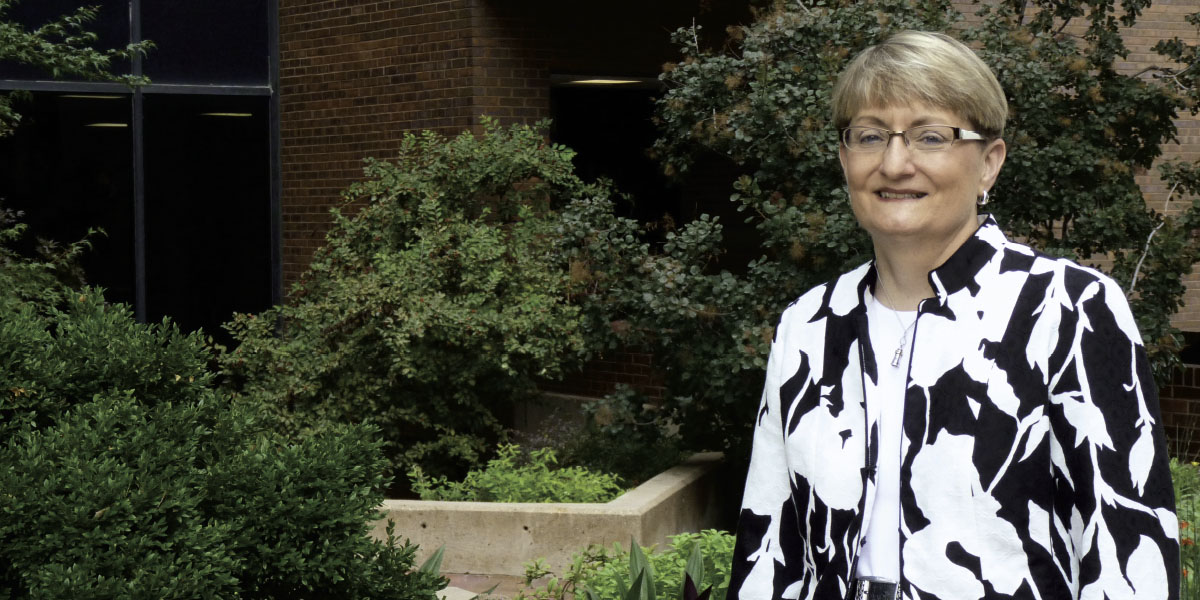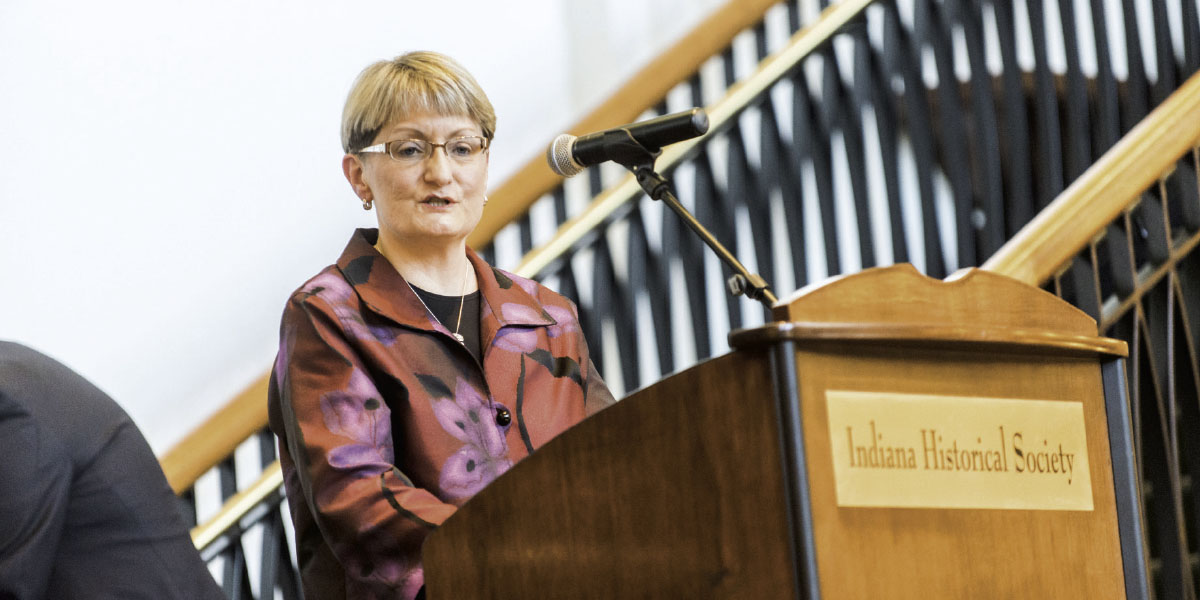Mary L. Herrin first encountered Wichita State University as a student. After completing her bachelor of science in business administration and then a master of science in accounting at WSU, Herrin wanted to work in a CPA firm. But, that was a time when it was difficult for women to enter the field.
She saw an opening at WSU, applied for the position, and was hired as a systems analyst. That was 35 years ago. Since then Herrin has held a series of positions, including director of budget and associate vice president for administration and finance. Now, as vice president for administration and finance, she has a deep understanding of the work that her staff does, and her experience helps her to be more supportive of them.
Herrin is responsible for developing, implementing, and assessing the financial management plans and activities at WSU. She provides leadership and support in the planning and management of the budget office, facilities planning, physical plant, police, purchasing, financial operations and business technology, and human resources. She relishes the challenges of each new day at WSU, which she believes keeps her work fresh.
Over the years, she has worked for five presidents and has helped in implementing their different visions for the university. These include transitioning WSU from a comprehensive to a research university, and from a commuter campus to one that offers more residential options.
At a time when higher education is facing its own set of challenges—
constrained financial resources, changing student expectations, increased international competition, and a lack of public confidence—Herrin, in an interview with Business Officer, explains why she thinks it is time to dig in and have an honest discussion of the value of higher education.
What do you think enabled you to move up the ladder at Wichita State?
I had an excellent mentor in Roger Lowe, who was so kind to give me the chance in the beginning to work in his office as a systems analyst. He also encouraged, from Day 1, my involvement in CACUBO and NACUBO, and the importance of professional development.
I have always been very curious at work. I love to know why things tick, and how the policies are written and why. I like to know the inner workings of something. I think that helps you get a better understanding to move on and work on different topics.
What has kept you engaged at Wichita State? You’ve obviously been challenged through different jobs, but there’s probably more to it than that.
It just seems like every day is different. There’s a new project from the board of regents. Or, getting acquainted with our new president, who came on board July 1, 2012. He had not been at WSU for more than a couple of weeks when he announced that we would be opening a new housing facility in the fall of 2014. We all looked at each other wide-eyed, but we’re going to get it done, and it is currently on track to be completed by the date he announced.
It has been a challenge and it has been interesting and enjoyable. That’s what I can say about my entire career—there has always been something new to address, whether it is a budget reduction that you have to deal with, a new assignment, or a new construction project to design and build.
What major changes have you seen in the area of accounting, finance, and administration at higher education institutions?
When I started at WSU, most everything was done by hand and with a calculator. A lot of people don’t remember the long columnar pads, mechanical pencils, and erasers. If you made a mistake, you were doing everything over.
Now we have Excel and other software that has totally changed the way we all do business. Enterprise resource planning initiatives have significantly changed job descriptions in the budget and finance offices, as well as access to data and enhanced reporting capabilities. The integrated approach has had a major impact on the way we do business across the campus—from the central accounting function to business transacted in individual campus departments. It’s been quite a transition.
Technology has helped you save time. How are you using the time now?
You have more time to reflect on the data and address other related responsibilities. You can respond to campus departments and managers a lot faster than you were able to when you were doing everything by hand. It has also cut down on errors.
How has your earlier background influenced your approach to your current role?
I understand the work that it takes to accomplish a lot of the tasks. I think you have to always remember that you were once in one of those roles that now reports to you. It gives you a better understanding of what your team members are experiencing. You can support them a lot more when you understand their challenges.
The complexity of higher education these days requires CBOs to have a lot more skills than just accounting. What advice would you offer to NACUBO members on how to manage their institutions, now that the role has expanded?
You have to hire directors who are knowledgeable in their particular field, make sure they have the resources needed to be effective, and not micromanage. That was one of my concerns when I first stepped into this position—that I would want to do the budget. But I think you have to step back, look at things from a higher viewpoint, and allow your dedicated staff to professionally manage their respective areas.
How were you able to get over that hurdle and realize that the higher view is where you want to be?
You don’t have time to micromanage. At first, it’s a learning curve to become familiar with everything, such as in facilities. Now, I love working with facilities and the challenges of campus improvements. At a higher level, you must find out how all the pieces will fit together and work on a plan to provide the various areas with appropriate resources.
Roger Lowe was the CBO when he hired you. You came in at an entry level and got promoted so that now you are Roger Lowe.
Right. And that’s something to remember. I am in Roger Lowe’s position, but I am not Roger Lowe. Roger was an outstanding mentor; however, one thing that you must remember is that you need to be yourself and stay true to the management style that is most comfortable for you. Define your own style.
There was a time when the CBO was about to retire and you were the heir apparent. How was that transition?
When it was somewhat known that I was going to go into that position, Roger was really good about talking with me about a number of the decisions he made. I was familiar with so many of the areas before I was appointed to this position.
I also think that when you’re the budget director, you really do learn some of the intricacies of different areas on the campus because you work individually with people to do their budgets. I love talking to people and sitting down and chatting about what they’re doing.
Another thing you need to do is to get out of your office and go visit with people. It’s so easy to get busy, to stay in your office, and not look beyond what you normally do. But it’s important to get out because it actually means a lot to people when you stop in and see how things are going. You need to broaden your horizons on campus and gain an understanding of how things really operate, rather than just taking them at face value.
NACUBO’s CBO demographic profile survey shows that with the number of people retiring in the next 5 to 10 years, there’s going to be a dramatic shift in who is taking on that CBO role. Mentoring is a really important component of that. What has been your experience?
One of the first things that I would recommend is that when you step into a CBO position, do not even think that you have to know everything, because that is impossible. That’s why you have good directors in your division. They are the experts and you rely on their expertise.
Make sure that you work together as a team and that everybody is more familiar with what’s going on. It’s about facilitating the communication among people who report to you. Include your staff in meetings and presentations for them to get a better “big picture” view of the campus. This is not always possible, but it should be a goal.
As a mentee to Roger, what did you learn from him that you have used yourself?
No matter what happens, always tell the truth. Even if it’s a difficult message to deliver, or if you have made a mistake, just admit it, and then figure out how to correct it. Don’t hide things. Be up-front and transparent.
And, sometimes, you just have to have those difficult meetings to deliver some unpleasant news. Whether you are telling someone good news or bad, the most important thing to do is to sit down with people, look them in the eye, and be honest. If you can explain to people why things are happening, they accept it much better.
What advice do you have for midlevel business officers who wish to prepare themselves for leadership positions?
Look outside of your specific job responsibilities to see how what you do relates to the vision and goals of your campus. Be aware of not just focusing solely on your current area of responsibility. Be a sponge and soak up as much knowledge as you can about other areas of the university.
You have spent your entire professional career in the central region and have been very active in CACUBO. In your opinion, what is distinctive about that region of the country?
The first organized meeting of college and university business officers occurred on Nov. 23, 1909, at Northwestern University within what is now the central region. CACUBO has a strong history in formalizing business practices for higher education.
People in the Midwest are known for their honesty, strong work ethic, and their collaborative and entrepreneurial spirit. They have the willingness to put in the time needed to direct the operations of CACUBO.
I appreciate the friendships of the people whom I have met in the central region. There are people who will check on you if you’re struggling with something. Sometimes they just call to say hello.
How would you articulate your plan for leading NACUBO?
I hope I can convey to the membership how valuable NACUBO is to all of us. NACUBO has a great relationship with the higher education community. I want to make sure that members understand that, and take advantage of the information and opportunities provided by NACUBO.
What do you want to accomplish in your year as chair?
I would like to develop an understandable explanation for all audiences to address the issue of why college costs are so high. We need to look at the issue from outside the viewpoint of an accountant and develop an explanation that is meaningful to parents, legislators, and the general public.
If you were asked by a reporter about the value of higher education, what would you say?
Attending a higher education institution broadens your horizons. It makes you aware of everything outside of your own space and of the importance of working together.
If you gain that, plus the knowledge and skills to go forward with your career, higher education is a chance for you to experiment and learn things, and we need to provide that environment for our future generation to prosper. I think all of us have a responsibility to be good citizens and to contribute to our work environment and to the population, in general.
Are there other things that you’d like to accomplish as board chair?
The long-range strategic plan is very important for the future of NACUBO, and that needs to be an element discussed at every board meeting. NACUBO members will need constant updates concerning the strategic plan and their relationship to that plan. The board needs to remain focused on the impact the strategic plan will have on the next generation of business officers.
What should members know about the work of NACUBO’s board?
The board composition is a diverse and inclusive representation of the NACUBO membership. The board members are committed to the mission of NACUBO. They have spirited discussions that lead to a consensus concerning the future direction of NACUBO. We have a group of very dedicated business officers who care about the profession and want to see the best for the future of those in higher education.
MARTA PEREZ DRAKE is vice president, professional development, at NACUBO.





